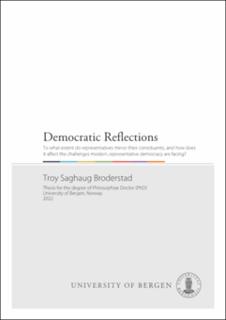| dc.description.abstract | This thesis addresses the important challenges that contemporary, representative democracies are facing, and shows how (better) representation can contribute to tackling them. In doing so, I limit the scope to one specific aspect of the research on representation, namely congruence. As such, the main question that I address in my thesis is: In what way does congruence matter for contemporary, representative democracies? To answer this question, I focus on four important challenges to contemporary democracy, namely democratic legitimacy, growing demand for direct democracy, political polarisation and emerging cleavages, and growing economic and political inequalities. In turn, I show how each of these challenges can be linked to the congruence between citizens and elites and how better representation can remedy some of the worrying developments in contemporary democracies.
Specifically, this thesis contributes with four articles, which stand as independent contributions to the literature, and, in the context of this dissertation, contributes to answering the overarching research question. In the first article, An Empirical Evaluation of Explanations for Political System Support, I focus on democratic legitimacy and study which variables best predict citizens’ satisfaction with democracy. I find that, among other things, congruence is an important predictor of regime support and argue that this covariate is understudied and under-theorised in the literature on satisfaction.
The second article, Procedural Congruence and the Delegate-Trustee Dilemma focuses on how elites evaluate a direct democratic procedure and whether they are congruent with citizens in their evaluations of such procedures. Using a novel survey experimental design, the article shows that elites have changing perceptions of the legitimacy of a referendum depending on whether the turnout and size of the majority are low or high. Representatives also have an outcome favourability bias. Additionally, we demonstrate that representatives are less likely to think that a referendum is legitimate compared to citizens. To understand this, we turn to the tension between the role of representatives as either trustees or delegates. The incongruence can be explained by the fact that trustees think referendums are less legitimate compared to delegates.
The third article, Conditional Satisfaction: Political Support, Congruence, and the (Un)certainty of Political Marginalization, uses insights from the first paper and study the conditional relationship between citizens’ satisfaction with democracy, ideological congruence, and government type. Article III pays particular attention to the conditioning effects of coalition governments’ ideological make-up and individual-level education. The findings show that higher educated citizens are more sensitive to being ideologically distant from single-party governments compared to coalition governments. In addition, the findings also show that higher-educated citizens are more satisfied, when incongruent, as the ideological diversity of multi-party governments increases.
The fourth article, Beliefs About the Income Generating Process and Social Preferences – a Comparison Between Elected Representatives and the Citizens explore how beliefs about the income generating process shape preferences for redistribution. The findings show that preferences for redistribution negatively associate with believing in meritocratic factors, both for citizens and politicians. Contrary to previous findings, the article provides evidence that the politicians’ redistribution preferences are more aligned with the less affluent compared to the more affluent and that elites want to redistribute more than citizens. Finally, the article shows that people who vote for parties on the left of the political spectrum are more congruent on income redistribution with their representatives than people on the right.
The thesis contributes to the existing literature on congruence with theoretical, conceptual, empirical, and methodological advances. Theoretically, I develop an argument about how malfunctioning representation may be a source of many of the challenges discussed above. Conceptually, I develop the concept of congruence based on existing research and I contribute with two new concepts, procedural and metabelief congruence. Empirically, I show that congruence is related to satisfaction, that citizens and elites are procedurally incongruent, and that meta-beliefs shape redistribution preferences. Methodologically, I employ diverse, state-of-the-art methodological approaches such as machine learning and survey experiments administered to elites and citizens. Taken together, the dissertation highlights the importance of congruence for the challenges facing contemporary, representative democracies and argue that better functioning representation can contribute to tackling these challenges. | en_US |
